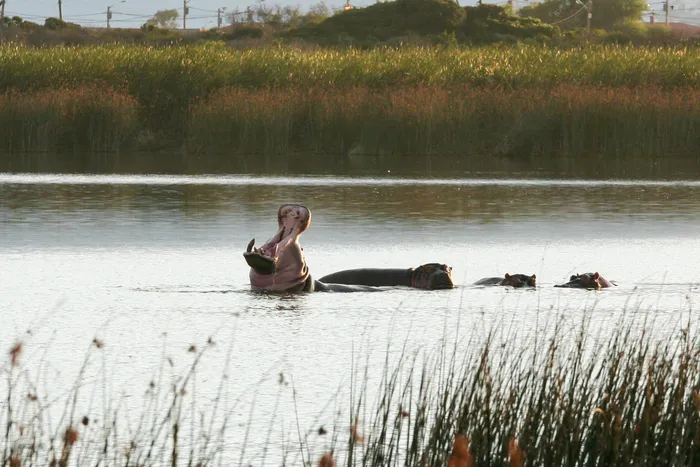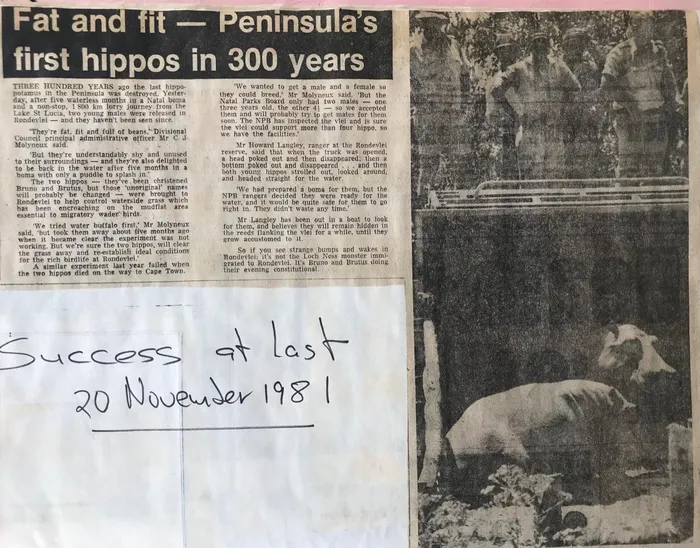
Staff from the False Bay Nature Reserve were busy with routine patrols when they discovered the dead hippo bull in the Rondevlei section of the reserve on Thursday morning.
Image: City of Cape Town
The City of Cape Town is in mourning following the passing of Brutus, the legendary hippo of the Rondevlei Nature Reserve. Known as the first hippo to be reintroduced to the Western Cape in three centuries, Brutus died last week at the venerable age of 47. His passing marks the end of an era, echoing in the hearts of those who knew him.
Brutus first arrived at Rondevlei in November 1981 as part of a significant ecological initiative aimed at restoring balance to the region's biodiversity. He not only became a long-standing fixture within the reserve but also a symbol of wildlife conservation efforts in Cape Town. Staff at the False Bay Nature Reserve discovered Brutus's lifeless body during a routine patrol last Thursday morning. Despite being in good health for his age, a subsequent autopsy confirmed that he succumbed to natural, age-related causes.
The Deputy Mayor and Mayco Member for Spatial Planning and Environment, Eddie Andrews, expressed his sadness at the news. “Brutus was the long-standing dominant male that arrived at Rondevlei in November 1981, and we are sad about not having him around anymore,” he said. Andrews emphasised Brutus's invaluable role, stating that hippos significantly contribute to maintaining biodiversity within wetland ecosystems and are vital assets for both education and tourism.
The story of Brutus is entwined with that of his pod, which now consists of five hippos, including a young bull. Andrews revealed plans to potentially introduce a new male to the group. Hippos play an essential part in the ecological system, particularly in controlling invasive species like Vleigras, a non-native grass that had been smothering the wetlands. Their powerful herbivorous diets allowed them to efficiently keep this invasive species in check.

Brutus arrived at Rondevlei in November 1981, and was the first hippo to be reintroduced into the Western Cape in 300 years.
Image: City of Cape Town
Notably, Brutus was also responsible for fathering several offspring, with some finding new homes in various reserves across the Western Cape, including the Plettenberg Bay Game Reserve earlier this year. The legacy of his powerful presence and protective instincts linger on, especially through his progeny.
Reactions from the local community have poured in, with many sharing affectionate memories of Brutus. One resident reflected, “RIP, Brutus. Thank you for all the years of being yourself and for the odd hippo grunt in the middle of the night that still gives me a thrill after 18 years of living here.” Another remarked, “RIP Brutus!! 47 is a great age, I suppose…. He's had quite a few fights with his male offspring over the years too… perhaps there will be a little peace there now.” Such sentiments encapsulate the deep connection Capetonians felt towards this gentle giant.
Brutus’s unique story is a reminder of the intricate relationship between people and wildlife, marking the impact one animal can have in a community. The City of Cape Town acknowledges his role not only in ecology but also in the hearts of those who cherished him. As the remaining hippo pod navigates a future without their dominant patriarch, the spirit of Brutus will remain as a testament to nature's remarkable resilience, forever etched in Cape Town's wildlife history.
Related Topics: